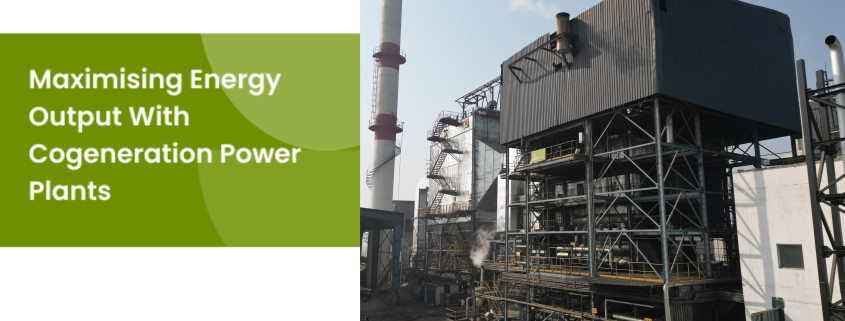Maximising Energy Output With Cogeneration Power Plants
Manufacturing companies have a responsibility to incorporate environmentally sustainable energy systems into their manufacturing processes. Cogeneration power plants address the need for sustainable power systems and are an essential element in the transition towards sustainability.
This blog explores how cogeneration power plants enhance efficiency and contribute significantly to reducing greenhouse gas emissions, its various applications, innovative technologies, and Uttamenergy’s cogeneration power plant solutions.
You will learn about:
- What are cogeneration power plants
- Applications of cogeneration power plants
- Cogeneration benefits and advantages
- Statistics and forecast
- Uttamenergy’s cogeneration power plant solutions
Cogeneration power plants
Also known as combined heat and power (CHP), cogeneration power plants involve the simultaneous production of electricity and heat from a single energy source. The process captures and utilises the heat that would otherwise be wasted during electricity generation. This enhances energy efficiency.
Let’s understand how cogeneration power plants differ from traditional power plants. Conventional power plants typically release excess heat into the environment. Cogeneration systems utilise this thermal energy for heating, thus making it more environmentally friendly.
Applications of cogeneration power plants
Cogeneration systems are versatile and can be applied across various sectors. Here are some of its typical applications:
- Industrial facilities: Cogeneration plants are used for process heating and electricity generation.
- Commercial buildings: Provides heating and power for hotels, hospitals, and office complexes.
- District heating systems: Supplies heat to residential areas through a network of pipes.
- Agricultural operations: Powers equipment and provides heating for greenhouses.
- Nuclear power plants: Emerging applications include using cogeneration for district heating and desalination processes.
- Energy-intensive industries: Used in various industries, such as chemical, paper & pulp, oil refineries, food & drink, among others.
Benefits of cogeneration power plant
- Increased energy efficiency: Cogeneration plants can achieve higher efficiency levels compared to conventional power plants.
- Reduced greenhouse gas emissions: Cogeneration systems reduce reliance on fossil fuels by utilising waste heat. This leads to lower carbon emissions.
- Cost-effectiveness: Manufacturing businesses can reduce their energy costs by generating their own electricity and heat and reducing fuel consumption.
- Improved self-reliance: Cogeneration power plants decrease reliance on external energy sources, making manufacturing businesses self-reliant and independent.
Statistics and forecast
- Asia is one of the fastest-growing markets for cogeneration
- The annual output of CHP systems globally amounts to 12,642 TWh of heat and 4,398 TWh of electricity, representing over 15% of total electricity generation.
- Demand for cogeneration systems is expected to grow in Asian countries, such as China and India, as well as in South America
- The need for smaller CHP installations (up to 10 MW) will grow for providing electricity and heat to residential and commercial users
- Japan has implemented numerous cogeneration systems post-Fukushima to enhance energy security.
- China is investing heavily in CHP technologies as part of its strategy to improve energy efficiency and reduce pollution.
Uttamenergy’s cogeneration solutions
Uttamenergy specialises in providing advanced cogeneration power plant solutions. Uttamenergy’s cogeneration solutions are designed to maximise efficiency and minimise emissions. The company has provided cogeneration power plant installations across various industries, including sugar and ethanol.
Some of Uttamenergy’s cogeneration projects include a 6.0 MW water tube 1 x 52 TPH 53 ata, 450°C AFBC rice husk/ coal, and a 9.0 MW 1 x 60TPH 68 ata, 490°C travelling grate bamboo chips plant.
Conclusion
Cogeneration power plants represent a crucial component in the transition toward more sustainable energy systems. By maximising fuel use through simultaneous electricity and heat production, CHP systems enhance efficiency and contribute significantly to reducing greenhouse gas emissions. With ongoing innovations and increasing global adoption, cogeneration stands poised to play a pivotal role in future energy strategies across various sectors. If you’re looking for cogeneration power plant solutions, contact Uttamenergy.



